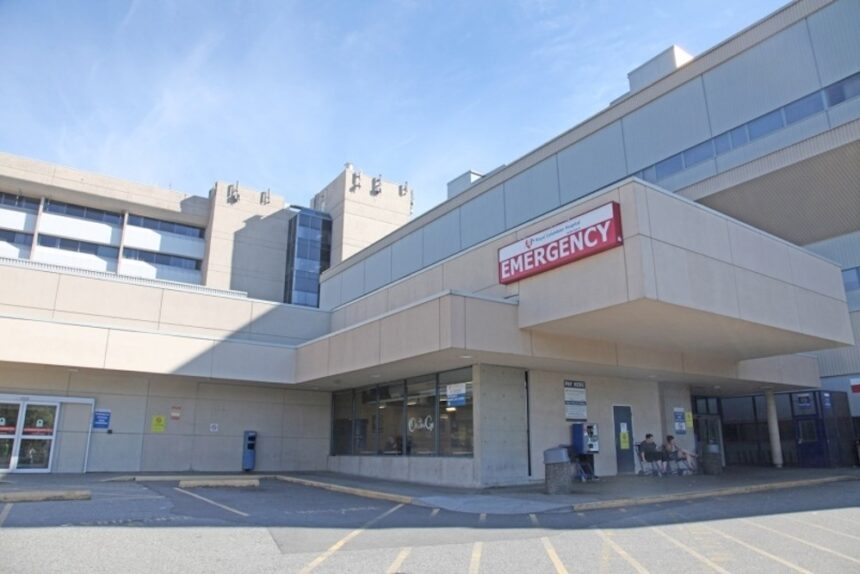The weathered automatic doors of Surrey Memorial Hospital open to a scene that would have shocked me five years ago. Today, it’s a grim tableau I’ve become accustomed to documenting: patients on stretchers lining hallways, nurses navigating around them like obstacles in a well-rehearsed dance, and the unmistakable cloud of exhaustion hanging over staff who’ve been pushed well beyond reasonable limits.
I’m here because Dr. Steven Fedder has done something rarely seen in Canadian healthcare: he’s suing his employer, Fraser Health Authority, over conditions he claims make it impossible to provide adequate care to patients.
“I didn’t make this decision lightly,” Dr. Fedder tells me as we sit in a café across from the hospital. His eyes shift between our conversation and his phone—he’s technically on break but expecting to be called back any minute. “But when you watch patients deteriorate in hallways because there’s nowhere to put them, when you have to choose which critically ill person gets the next available bed… something fundamental has broken in our system.”
Fedder’s lawsuit, filed last month in B.C. Supreme Court, alleges Fraser Health has allowed emergency department conditions to deteriorate to the point where they violate both patient safety standards and physician workplace rights. The emergency physician of 15 years claims persistent understaffing, lack of beds, and administrative negligence have created an environment where providing standard of care has become nearly impossible.
Fraser Health serves 1.9 million people—nearly 40% of B.C.’s population—stretching from Burnaby to Hope. The health authority has responded to the lawsuit by acknowledging challenges but maintaining they’re working within provincial constraints while implementing improvement strategies.
“We’re seeing four or five patients at once, in spaces never designed for care,” explains Fedder. “Last winter, I had a stroke patient waiting 36 hours for a proper neurological assessment. By then, the window for certain treatments had closed.”
This lawsuit represents more than one doctor’s frustration—it’s a spotlight on a crisis brewing across Canadian emergency departments. According to the Canadian Association of Emergency Physicians, emergency department wait times have increased by 12% nationally in the past five years, with some regions reporting much higher increases.
“What’s happening isn’t just about Surrey or Fraser Health,” says Dr. Carolyn Howard, an emergency medicine specialist who previously worked alongside Fedder but now practices in Victoria. “Emergency departments are the canary in the coal mine for healthcare system failures. When we’re in crisis, it means everything upstream is failing too.”
Howard’s assessment aligns with data from the Canadian Institute for Health Information, which shows that about 90% of emergency department delays stem from the inability to transfer patients to appropriate inpatient beds—a problem known as “access block.”
The lawsuit specifically references several incidents where Fedder claims patient safety was compromised. In one case, an elderly patient experiencing chest pain allegedly waited 11 hours before receiving proper assessment, during which time their condition significantly worsened. In another, a child with suspected sepsis reportedly waited four hours for antibiotics due to overcrowding and staff shortages.
Walking through Guildford Town Centre the day after meeting Fedder, I speak with Surrey residents about their experiences. Almost everyone has a story.
“My father waited 14 hours with a broken hip,” says Manjit Kaur, 43, shopping with her teenage daughter. “By the time they got to him, he was dehydrated and confused. The nurses were apologizing constantly, but they were running between so many patients.”
The Fraser Health region has experienced particularly intense pressure due to rapid population growth. Census data shows the region grew by 7.6% between 2016 and 2021, significantly outpacing healthcare infrastructure development. Surrey itself grew by nearly 10% during that period.
Ministry of Health figures indicate that while B.C. has added approximately 602 new hospital beds since 2017, population growth has far outstripped this capacity increase. The province would need over 1,200 additional beds just to maintain the same beds-per-capita ratio as five years ago.
Dr. Michael Howlett, President of the Canadian Association of Emergency Physicians, didn’t comment specifically on Fedder’s case but noted that legal action by physicians remains rare in Canada. “The fact we’re seeing lawsuits like this suggests we’ve moved beyond the normal tensions in healthcare delivery to something more fundamental,” he explained during a phone interview. “Doctors typically exhaust every internal avenue before taking such drastic steps.”
For its part, Fraser Health issued a statement acknowledging “unprecedented pressures” but defending its response: “We continue to implement innovative approaches to care delivery while advocating for resources that match population needs.”
But innovations can only stretch so far in a system struggling with fundamental capacity issues. B.C. Nurses’ Union representatives report that nurses in the region regularly work double shifts, with some emergency departments functioning at 50-60% of optimal staffing levels.
“We’ve normalized what should never be normal,” says Emma Trudeau, a nurse who requested I use a pseudonym to protect her employment. “Providing care in hallways, having patients wait 12+ hours to be admitted—these were once exceptional circumstances. Now they’re Tuesday.”
As my reporting on this story concludes, I receive a text from Dr. Fedder. He’s just finished a night shift where the department was at 215% capacity. “This is why I’m doing this,” he writes. “Not for me, but for them.”
Whether his lawsuit succeeds or not, Fedder has accomplished something significant: forcing a public reckoning with conditions that have been deteriorating behind automatic doors that most British Columbians only walk through in their most vulnerable moments.
The true test will be whether this legal challenge translates into meaningful changes for patients waiting in hallways across the Fraser Health region—and whether it inspires similar actions throughout a healthcare system where many providers feel they’ve exhausted all other options for being heard.






